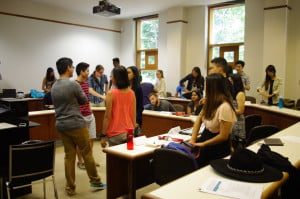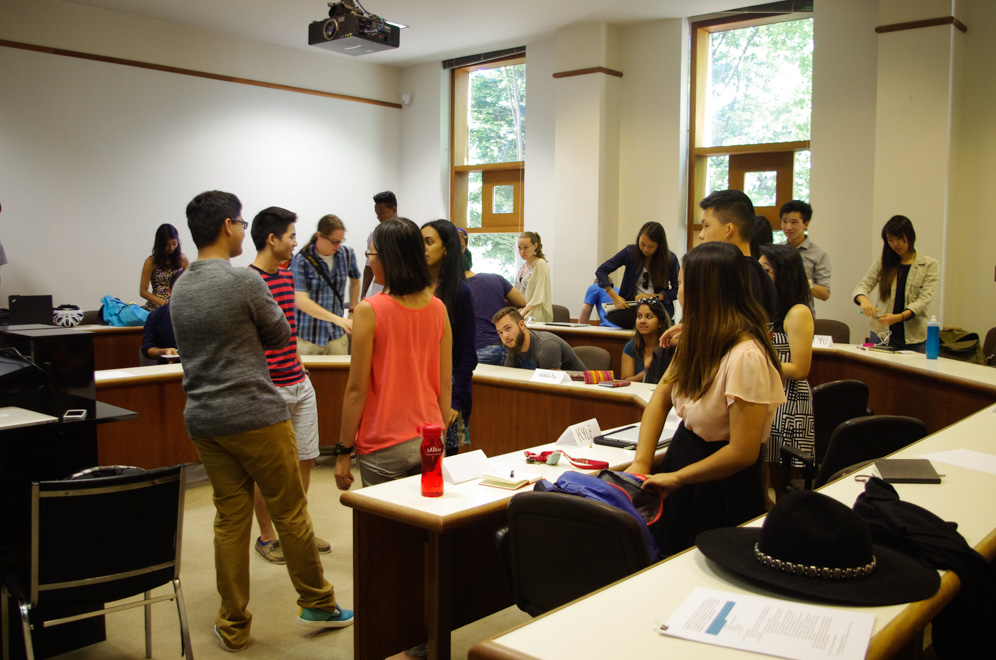
This quarter, students enrolled in CS 90SI: “CS + Social Good: Using Web Technologies to Change the World” will seek to effect global change through a variety of web development projects. One such project is a collaboration with the Aam Aadmi Party (AAP), the current ruling political party in Delhi, that will help citizens hold politicians accountable for their campaign promises.
Inspired by Politifact.com’s “Obameter” and the “Morsi Meter,” students in CS 90SI will build an application that monitors which promises the AAP has and has not kept.
“Right now we are building this [tool] for the AAP, but we want to take this beyond to every other political party in the country,” said Manu Chopra ’17, one of the course’s designers and student instructors.
The AAP, founded on a platform of anti-corruption, seeks to establish an open relationship with Delhi’s 20 million residents and hopes to effectively communicate with them through the digital medium, Chopra said.
“The new government is trying to revamp everything and make it very digital,” Chopra said. “We approached them and said, ‘Hey, do you have a project for CS 90SI?’”
Roshan Shankar M.P.P. ’14 M.S. ’14, an advisor to the Delhi government and a former Stanford graduate student, helped connect the students with projects they could work on.
The political accountability tracker is but one of two overarching projects that CS 90SI has designed in collaboration with Delhi politicians, both of which are slated for deployment in December.
Students interested in governmental operations, like those creating the tracker for AAP, will also build an application that allows citizens to submit questions to the AAP’s members of Parliament, who would in turn raise the questions during Parliament’s “Question Hour.” The students will also create a public grievance management system designed to circumvent long lines at government offices — grievances will be reported over the phone, and the caller’s name, location and stated problem will be automatically parsed.
Another group of students will work with Delhi’s Department of Tourism to build an intelligent audio tour guide that registers a visitor’s location and educates them about their surroundings. The students will also redesign the department’s website.
Government officials in Delhi, including Delhi Tourism Minister Kapil Mishra, were happy to receive this help from Stanford students.
“To make Delhi world-class, we have to partner with institutions having a focus on creating positive social change,” said Mishra in an e-mail to The Daily. “CS 90SI approached us with this unique project. They asked us for two challenges, and we complied.”
CS 90SI co-leader Lawrence Murata ’17 said the Delhi government has been extremely supportive.
Chopra and Murata are passionate about using computer science for social impact, and together founded the student organization CS + Social Good a few months back. They believe that there is more to computer science than creating the next billion-dollar startup.
“I don’t like the fact that the most famous thing that came out of Stanford in the past five years is an app which deletes photos in two to three seconds,” Chopra said. “I mean, Snapchat is awesome. It’s a lot of fun, and I use it. But there has to be a better use of [a] Stanford education.”
“We believe that CS and social good go well together and [that] this is the best way to use computer science,” he added.
Chopra admitted, however, that it is difficult to sell non-profit work to students. As such, CS 90SI also offers students an opportunity to work on a project for Google (one related to education, in keeping with the theme of the course), in addition to projects designed for the Delhi Government projects and non-profit companies Sirum and LaborVoices.
“We’ve had people that want to work with Google just because it’s Google, not because the project is exciting,” Chopra said.
The two-unit class ultimately had no problem attracting interest: it received over 315 applications for its 20 spots.
Contact Erica Evans at elevans ‘at’ stanford.edu.
